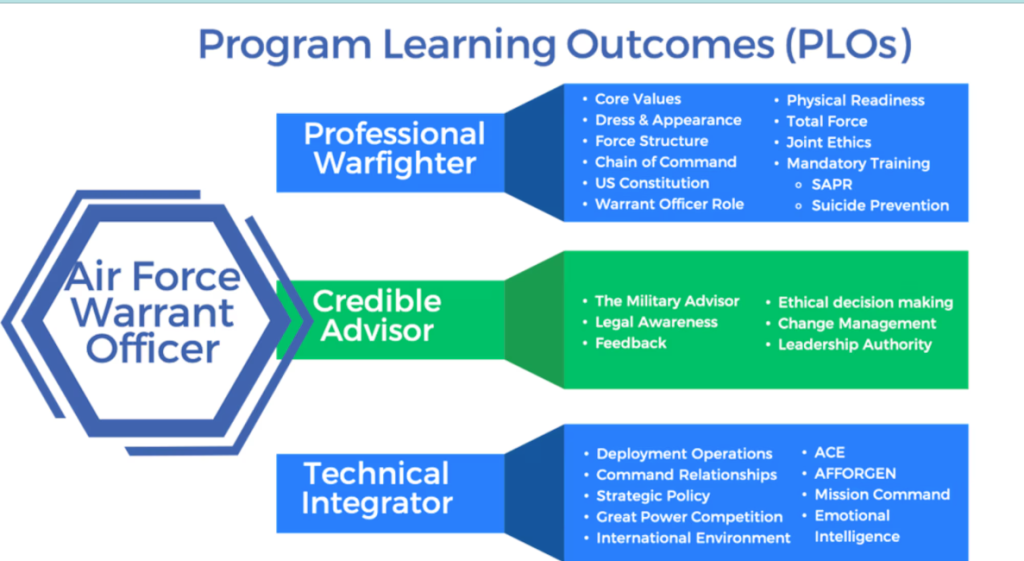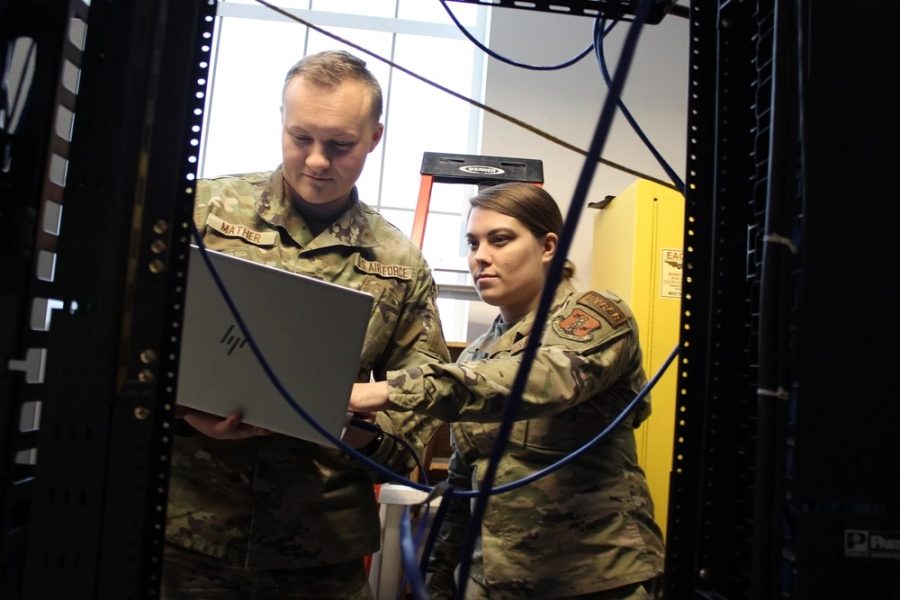The Air Force’s first cohort of warrant officers in 65 years will be already skilled cyber or IT specialists, and their training is designed to teach them how to become the critical link between warfighters and their leaders on technical issues, according to the officer in charge of training them.
“They’re there to advise the operators, their commander, and higher-level leadership on how to use these [cyber and IT] capabilities, and to be on the front lines, using those capabilities themselves,” Maj. Nathaniel Roesler told Air & Space Forces Magazine.
The warrant officer program, unveiled in February, creates a new layer of leadership in the Air Force—a way service members can progress their careers without having to broaden and generalize their skills to rise up the ranks of NCO leaders. It’s also meant to equip the service to compete against China and other great powers in the digital domain, where technical skills can be decisive.
“As an NCO progresses in their career, they tend to become more of an organizational leader, a people manager, and so their skills broaden,” said Roesler, the commandant of the newly minted Warrant Officer Training School at Maxwell Air Force Base, Ala.
“We’re a technical service. … We want our warrant officers to be a foot wide and a mile deep in their expertise,” he said. “They’re really there to grow in a particular skill. As they progress in their career, become even more specialized, we want to increase their level of knowledge and their ability to operate in the Air Force.”
The eight-week program the Warrant Officer Training School has developed is not just the first Air Force warrant officer program for more than 65 years (the last USAF warrant officers were created in 1958), Roesler said—it is effectively the first ever.
“Remember,” he said, “the Air Force inherited its warrant officer program from the Army,” so in designing their training, the school had to start from first principles. They began by deriving five “Warrant Officer Foundational Principles”—communicate, advise, influence, innovate, and integrate—from the service’s 24 Foundational Competencies for Airmen.
It is no accident that “communicate” comes first.
Twenty-first century warrant officers, Roesler explained, need to be “exceptional communicators under stress, they need to be able to credibly advise their commanders who are leading these operations,” while also having the specialist technical knowledge to understand the capabilities they are bringing to bear. The school aims to turn out individuals who can work across services, he added.
“We’re not trying to make warrant officers into better cyber operators,” he explained. “They come to us with those skills, with years of practical experience. What we’re doing with them is building them into …the Air Force’s leading professional warfighters, technical integrators, and trusted advisors.”
Those three targets he lists are the three “program learning outcomes” for the school. They were derived, along with the five foundational principles, from the service’s 24 foundational competencies.

The credible advisor role includes training in “legal awareness,” “ethical decision making,” and “change management.” Technical integrators need to understand “deployment operations,” “great power competition,” and the “international environment.” It also requires “emotional intelligence.”
Professional warfighters also need to study “dress and appearance,” “physical readiness,” and “core values,” as well as “force structure,” “chain of command,” and “U.S. Constitution.”
Some of these elements will be included in a 10-14 day “on-ramp” being designed for civilians with specialist skills recruited directly into the warrant officer program if that’s required in the future, said Roesler.
“Right now they are all prior service, E-5 and above” he said of the school’s prospective trainees, but once the on-ramp proves out, the school would be ready to expand to include these so-called “Street-to-seat” candidates.
In the meantime, Roesler explained, the on-ramp would be valuable for the experienced NCOs in the initial cohorts, too. “It’s always good to brush up on those skills: Air Force history, culture, and chain of command. It’s valuable training for anyone, but particularly for people who don’t have prior Air Force experience,” he said.
Program learning outcomes are the key to “outcomes-based military education, which is how the Department of Defense does education,” said Roesler. “They think about military education in a way that can be measured, that can be trained to, that can be assessed: How well we’re doing and how well the service member is doing in that education.”
That outcomes-based approach was also informed by research into optimizing human performance, according to Lt. Col. Andrew Wonpat, the interim deputy Principal Cyber Advisor to the secretary of the Air Force.
“There’s this idea: We’re just gonna run,” he told AFCEA’s recent TechNet Cyber event in Baltimore. “We’re just gonna run stronger, harder, faster, longer. And that’s not how it works. That is not how Olympians train. That’s not how you identify, assess, and develop Olympians. It’s not how industry develops its high performers, it’s not how the [Special Operations Forces, or] SOF community does it.”
A key attribute for warrant officers will be the correct cognitive approach, Wonpat said, “When you receive new information, can you update your model to get you to a new and novel solution?”
So far the program is only for Air Force personnel, not Space Force, but Air Force Secretary Frank Kendall has talked about expanding it to other specialties besides IT and cyber if the program is a success in those two fields.
“The awesomeness about the Warrant Officer [program] is, it’s new,” Wonpat said, “They don’t come with a lot of baggage, of traditions. They haven’t got to break through a lot of ‘We’ve always done it that way.’”
Working with the DOD CIO Workforce Innovation team, Wonpat said he’d sought to understand about the warrant officer program, “how does this scale across the service or the DOD?”
The Air Force has announced two cohorts of 30 trainees, Roesler said, the first starting in October and graduating in December, the second reporting for training in January and graduating in March. A planning document, posted on the web and verified by Air & Space Forces Magazine earlier this year, said the service plans to be able to scale up to 250 graduates per year.
”We’re postured to scale to whatever size, essentially, the Air Force needs,” said Roesler. But he added that individual warrant officers, because of their skills and their critical positions at the hinge of new capabilities, would have an asymmetric effect. “They will have an outsize impact,” he said.


